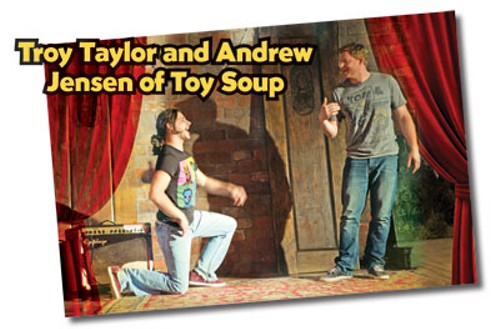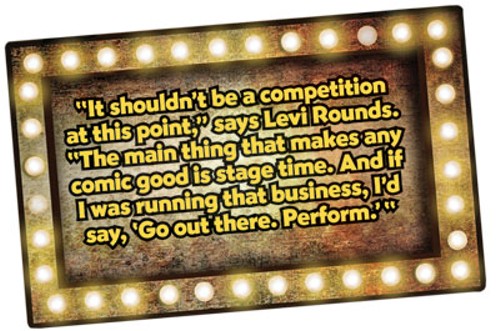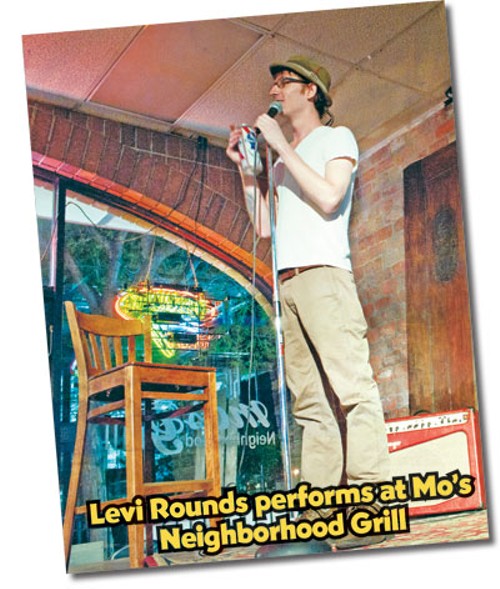Funny Business
Think you know Utah stand-up comedy? The joke's on you
By Scott Renshaw @scottrenshawPage 2 of 2
Can He Say That?
As Wiseguys was able to build a brand—and establish a place for local comedians to perform—the natural desire of comics to push the envelope bumped up against questions of what kind of content would work for a Utah audience. Many local comics began to feel that if you wanted to perform at Wiseguys, it was wise to watch your mouth.
“When we’d perform at Wiseguys,” recalls comedian Christopher Stephenson, “there [were] a lot of guidelines as far as what you should be writing your material about. … ‘You’ve got to tone it down, you can’t swear, you can’t say ‘bitch’ or ‘fuck,’ you can’t talk about abortion, keep politics out of it.’ ”
“I swore there once,” says Troy Taylor, who performs stand-up as well as improv as part of Toy Soup. “I said the F-bomb, and I got in trouble for it. They said they had to change the parental rating.”
Norman acknowledges that there were instructions he would give to open-mic’ers during his tenure at the West Valley Wiseguys. “I would say, ‘You can say whatever you want. We don’t want you to feel we’re restricting you artistically,’ ” Norman says. “ ‘But, keep in mind, if you want me to recommend you to be on a show, here’s the expectations: You’re not going to be dropping the F-bomb. It’s not that we have the rule, it’s just that the audience will get up and walk out. Here’s what’s going to work here, it behooves you to do it that way.’
“We just encouraged people to work clean to begin with, it just opens them up: ‘Look, if you want to be successful in this market, this is what you have to do.’ One guy, he was very funny; ‘I want to recommend you for doing shows, but you keep dropping the F-bomb. If you can just learn to clean up, you can play other shows.’ And he just disappeared.”
Wiseguys’ open-mic nights have since moved to the location in Trolley Square on Wednesday evenings—and if a recent show is any indication, if there ever were any content limitations, they’re now long gone. A full lineup of 30 comedians covered familiar territory involving relationships, yet also ventured into abortion, child molestation and other dark avenues—with an extremely liberal sprinkling of “fucks.” While other comedy clubs around the country—including bigger markets like the San Francisco Bay area and Phoenix—provide specific recommendations for comics’ open-mic material, Stubbs opts not to do so.
“I just let open mic be what it is,” Stubbs says. “Do your thing. Doesn’t mean I’m gonna book you. But do your thing. I get asked that question every week: ‘What can I do onstage?’ Do whatever you want.”
The Next Stage
Nevertheless, the perception that comics who wanted to work “blue” weren’t what Wiseguys was looking for led to an interest in finding alternate venues for stand-up. There was also the simple reality that a single three-minute open-mic set once a month—which was the frequency at the West Valley Wiseguys—wasn’t nearly enough to allow a comic to improve. In 2003, Troy Taylor got an inquiry from the then-manager of Mo’s Neighborhood Grill in downtown Salt Lake City about starting a weekly comedy night on Sunday evenings.
“Not too many comics showed up, maybe five or six,” Christopher Stephenson recalls, “so we could all do basically as much time as we wanted. … It was a lot more exciting than just doing three minutes of stage time every week. Troy had no preference on content, so you could talk about anything you wanted to talk about without getting kind of ‘talked to’ after the show.”
“It was just so freeing at Mo’s,” says Andrew Jensen, Taylor’s Toy Soup collaborator, “because there was no one looking over your shoulder telling you you’re a bad person.”
Eventually, however, stories began to circulate that Stubbs was either directly or indirectly discouraging comedians from performing at venues besides Wiseguys. Stephenson says, “I’d basically followed the rules until I got in contact with Troy and I found out that you can do what you want to do onstage; it just has to be a different stage. It was after I took classes from [Wiseguys] that [encouraged comedians] to perform more, or it’s not really going to go anywhere. So I got really excited and I told [Stubbs] one day that I was going to try to get more stage time and do this show on Sunday and still be able to do Wiseguys shows. And that was when he said, ‘Yeah, that’s cool, go do that. Just don’t come back here.’
“I didn’t really know that I was going to get told not to come back anymore. I had heard that you’re not supposed to do other shows. But at the same time, I just weighed out my options. Three minutes a week, maybe a few opening spots … I just decided I do need more stage time and be able to write about what I wanted to.”
Comedian John Hilder says the rumor mill is very pervasive. “There are comics that are at Wiseguys every week that tell the comics, ‘Hey, yeah, there’s other shows around town, but if Keith finds out, he’s not gonna like it.’ ”
“It shouldn’t be a competition at this point,” Levi Rounds says. “The main thing that makes any comic good is stage time. And if I were running that business, I’d say, ‘Go out there. Perform. Get on stage twice a night if you can.’ The better they get, the more shows I, as a business-owner, could run and do well and bring people out.”
Stubbs rejects any notion that he has blackballed comics from Wiseguys for playing other venues. “There are comics right now that work for me that I know work all over the town. And I’m all right with it, and I don’t care. I have no problem with comics getting stage time. I’m a comic; I know what it’s like to get on stage. But when it gets down to it, I own Wiseguys, and I’m the biggest advocate of Wiseguys—understandably, I hope—out there. I don’t care about other places. I really don’t. I cared about it at another time in my life, when I was new, hoping that my business would survive. Because it’s not easy. … I know how hard it is now, though, to keep it going, to keep it interesting, to keep it entertaining. And it’s difficult.”
Making It
For all the growth in opportunities for comedians to get stage time, there’s still a sense—as Stubbs believed when he first opened his own club—that anyone serious about making a living at comedy can’t expect to do it in Utah alone. Recent breakout success stories like Last Comic Standing contenders Marcus and Ryan Hamilton have either taken to the road or re-located to larger markets. Rodney Norman moved to the New York City area four years ago, and John Hilder will be performing a farewell show at Club DJ’s K-Town Komedy showcase before relocating to New York. Andrew Jensen and Troy Taylor estimated that in 2011, they probably made less than $2,000 from performing comedy. Comedians who work every available gig still—like local professional actors—generally work day jobs or wait tables to pay the bills.
Those who do continue to perform regularly—moving past those first tentative open-mic gigs to more regular work—still have to navigate the tricky territory between their own preferred style and the expectations of audiences locally.
“Honestly, every show I do, 10 percent of the people are pissed off, don’t like anything I say,” Levi Rounds says. “But 90 percent of the people really do like it. … I’ve had people say, ‘My friend came to see your show, and he said he hated it because you talked about religion, but I kinda wanted to come see it.’ So it doesn’t hurt me necessarily; it’s only helped. I never did it specifically to go against the grain or anything. That’s just who I am.”
“Clean comedy has its place, but that’s not what I’m doing,” Hilder adds. “My philosophy is, a great joke shouldn’t offend everyone, but it should offend someone. If my mom likes a joke, it’s probably not one I’m going to use onstage.”
Stubbs, meanwhile, continues to book national touring comics like Dave Attell, whose material is outside what most might perceive as the Utah mainstream—though he admits it took him some time to realize that there would be a receptive audience: “I think the audiences here—and I don’t want it to sound insulting, but they’re a lot more savvy, a lot more hip than I gave them credit for. And that’s my fault. I didn’t know that they knew some of the comics that I knew, because I’m in the business. But they know. They know more than you think they do.”
What they might not know—yet—is how many talented comedians are living right here. “There’s this perception by Utahans about Utahns, that Utahns aren’t funny,” says Norman. “You don’t have to be from L.A. to be funny. … Utah has turned into one of the best places to start doing comedy.”
Funny how it’s worked out that way.
| Local Comic Profiles
Brett Hodson Day job: Runs his own digital and social-media marketing company; bartends at The Depot. Comedy idols: “Kathleen Madigan. She’s smart and funny and conversational in her humor. … I [also] grew up with old Ellen DeGeneres’ stand-up, years before she came out.” Definitive “rough crowd” story: At the Rocky Mountain Laugh-Off in Rock Springs, Wyo. “We only have three to five minutes, so you really had to get to it quick. My opening bit for other shows, was ‘Hello, my name is Brett Hodson, and I’m a raging homosexual.’ So I did that, and … I kid you not, one guy leaned over to his wife and said, “Oh my god, it’s a queer.” … [The room] was just like dead silence, like, ‘If you laugh at him, you’re a queer.’” Describe your comedy style as though it were a review in Wine Spectator: “I would say it has gay afternotes, and gay beforenotes, with a peppery, dark aftertaste.”
Melissa Merlot Day job: Works in a hospital. Doesn’t get too much material from it, because “it’s kind of a downer.” Comedy idols: Traci Ullman, Julie Brown. Definitive “rough crowd” story: “I think you can win anybody over; even if they’re not laughing, you can turn it into a spectacle. My worst crowd is always the typical hecklers who yell, ‘Show us your boobs.’” Describe your comedy style as though it were a review in Wine Spectator: “That’s perfect with my name. … A full-bodied, dark blend that goes down smoothly with a very charming aftertaste.”
Greg Orme Day job: Legal assistant at Match & Farnsworth P.C. Comedy idols: Patton Oswalt, Todd Barry, Sarah Silverman, Eugene Mirman, Richard Lewis, Jon Glaser, David Cross Definitive “rough crowd” story: “I was performing at a bar, and the audience was not into it at all. The bathroom was directly behind where I was performing for some reason, and some guy got up to use it. On his way back he went to high five me and pulled away at the last second. Bastard.” Describe your comedy style as though it were a review in Wine Spectator: “Dry, definitely. Takes you on a magical journey to places you forgot existed. Oaky, probably. Yes. Oaky.” |
More by Scott Renshaw
-
CHALLENGERS feature movie review
Zendaya centers a romantic triangle with a unique relationship spin
- Apr 24, 2024
-
Film Reviews: New Releases for April 19
The Ministry of Ungentlemanly Warfare, Abigail, The Beast, Hard Miles, Sasquatch Sunset and more
- Apr 19, 2024
-
Faces of Salt Lake County book and portrait reception
Images and personal stories in a new book reveal local demographic diversity
- Apr 17, 2024
- More »
Latest in Cover Story
Readers also liked…
-
Forget the family pedigree—Robert F. Kennedy Jr should not be the next president of the United States
Trojan Horse
- Jun 21, 2023
-
Women decry harassment and toxic culture at St. George auto dealership
Men at Work
- Oct 11, 2023








